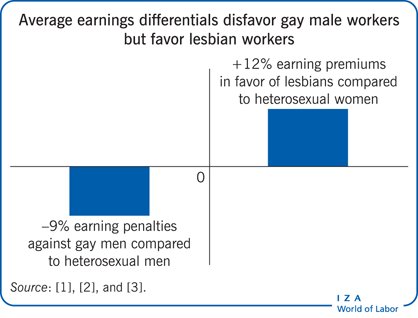Elevator pitch
Studies from countries with laws against discrimination on the basis of sexual orientation suggest that gay and lesbian employees report more incidents of harassment and are more likely to report experiencing unfair treatment in the labor market than are heterosexual employees. Gay men are found to earn less than comparably skilled and experienced heterosexual men. For lesbians, the patterns are ambiguous: in some countries they have been found to earn less than their heterosexual counterparts, while in others they earn the same or more. Both gay men and lesbians tend to be less satisfied with their jobs than their heterosexual counterparts.
Key findings
Pros
Gay men and lesbians who are open about their sexual orientation at their workplace are more likely to report higher job satisfaction than those who are not.
The number of years gay and lesbian workers have been open about their sexual orientation in their current workplace is positively associated with their job satisfaction.
Good relations between employers and employees increase openness on the part of gay male and lesbian employees and improve their attitudes about their jobs.
On average, lesbians earn more than comparable heterosexual women.
Cons
Fewer than 20% of countries have adopted sexual orientation anti-discrimination laws in employment, and 2.7 billion people live in countries where being gay or lesbian is a crime.
Gay men receive lower earnings than their male heterosexual counterparts.
Gay and lesbian employees have lower job satisfaction than their heterosexual counterparts.
All qualitative studies suggest that gay and lesbian employees are more likely to be harassed by work colleagues than are their heterosexual counterparts.
